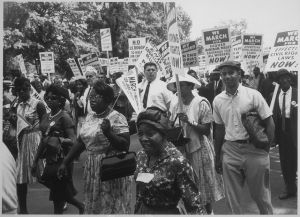A Postracial Aftermath? Reconstruction’s Fantasy

Civil Rights March on Washington. Photo courtesy of the Archives Foundation. http://tinyurl.com/j67jl94
“Aftermath” presumes a prequel, a conflict concluded, though perhaps not fully resolved. Americans might look cynically on sequels when it comes to movies, but with history we want to believe that the sequel is better than whatever came before. Slavery was overcome through the Civil War and Reconstruction. Segregation was overcome through the Civil Rights Movement. And yet the word “aftermath” can have a dark connotation when it reminds us that victories reveal or even contribute to deeper problems. The aftermath of slavery included a wave of racial violence and repression that utterly defies the progressive narrative of American history. The Civil Rights Movement was followed by lingering problems like black poverty and an increase in racialized mass incarceration. After the election of an African American president in 2008, some commentators suggested that the United States had entered a “postracial” age, but the violence and protest of the past two years prove otherwise.
The hope for a “postracial” time is not as new as the word. In the aftermath of the Civil War, the Republican leaders of Southern Reconstruction hoped that legislation could remove the problem of race from American politics and make their party less controversial. Five years into Reconstruction, the Democratic opposition even considered a “new departure” that would accept the Republicans’ accomplishments, mute racial rhetoric, and emphasize nonracial divisions. But once the Republicans passed the Fourteenth and Fifteenth Amendments and the Democrats coopted a “color-blind” or “race-neutral” rhetoric, it appeared to many white Americans that further protests by African Americans were unjustified. Today, with the readiness of some white Americans to blame black Americans for the lingering problems of race in a supposedly “postracial” age, all would benefit from a closer look at how a similar dynamic unfolded 150 years ago.
* * *
After the end of the Civil War, many African Americans hoped that national power would resolve the evil of racism, as it had that of slavery. Few if any believed that former slaveholders would readily embrace their former slaves as social equals, but legislation in support of equal civil and political rights might create a new racial climate for the future. After Congress mandated that the former Confederate states accept black voting rights as a condition for returning to the Union, Robert Fitzgerald, a black educator and grassroots activist, reflected that “the days of distinction between colors is about over in this (now) free country.”1 African Americans like Fitzgerald drew their hope from the fact that some Southern whites were abandoning their commitment to race prejudice and forming new ones to a biracial political party. Former slave Abraham Galloway declared at a Republican Party convention that “I stand here as a representative of the Republican party,—neither Republican blackman nor Republican whiteman [sic], but the Republican party, knowing and acknowledging no distinctions, nor cliques.”2 At the same convention, Alfred Stokes jested, “as I am getting old and can’t see very well, I can hardly tell whether these are all white people, or all colored. (Laughter.) If I make a mistake in regard to color, I hope you will excuse it.”3 Though former slaves hoped for the empowerment of black lives specifically, they also imagined a colorblind society.
Hardly all Republicans were proponents of racial equality, but new political circumstances influenced those who had the closest ties to African Americans and stood to benefit from racial collaboration. White Southerners who sought to make friends with former slaves were quite vocal in divesting themselves of racial privilege. For example, William Woods Holden responded to an anti-Reconstruction pamphlet exposing his prewar use of racial rhetoric by explaining that the statements he made eights years before “are no longer my views; and my colored friends know that as far as I am concerned I heartily welcome them to the freedom which the Union arms have secured for them.” He told them he did not “pretend . . . to be either consistent or infallible,” but had declared himself for black suffrage and now went further, saying, “I take a colored friend by the right hand and call him, politically and civilly my equal.”4 Since Holden and other white Republicans stood to gain power from biracial politics, it is reasonable to doubt their sincerity. At the same time, however, African Americans understood that white Southern allies jeopardized their reputations by joining the Republican Party and added force to a movement for political and cultural change in matters of race.
African Americans in the Reconstruction South worked to mold their white allies. They validated the liberal professions of white Republicans, as when black spokesman James Henry Harris testified to Congress that Holden was “especially conspicuous and indefatigable in his efforts in behalf of the Union, the cause of Liberty, humanity, and justice.”5 When Holden became governor of North Carolina and was threatened with impeachment, leading blacks published a broadside comparing Holden, “our good friend,” to the biblical Mordecai who stood between the murderous Haman and genocide.6 Simultaneously, African Americans also put pressure on their allies to fight for their interests, both in terms of national legislation and local matters. Jordan Chambers, “a colored man . . . who has tried to do his full duty to you and our noble party,” tried to leverage his grassroots activism in Iredell County by mentioning all the incentives he had not to be a Republican. “During the late election my influence was sought on both sides,” wrote Chambers, and though he ran as a Republican, he said “the Conservatives vainly endeavored to induce me, by the most tempting considerations, to take that name off, to come out and curse the party, and thus bring the colored men of Iredell and Rowan en masse to their standard, for these were all looking (and pardon the egotism) how I was going.” Chambers asked for an appointment to office that would give him power and an independent subsistence.7
African Americans benefited from the fact that white allies shared some common interests and were willing to imagine a more liberal racial order. However, a fundamental misunderstanding was reached in the 1870s when white Republicans came to believe they had fulfilled their commitment to African Americans. White Republicans all along had hoped that biracial politics and an acceptance by the Democratic opposition of the civil rights amendments would mean that race would drop out of politics. Parties would divide over tariffs and currency issues, not the particular concerns of African Americans. On the other hand, African Americans believed that political equality meant that African Americans would be able to confront the issues that most impacted their lives, such as inequalities in public accommodations, livelihood, and legal justice. While progressive whites wanted race to go away, African Americans wanted a truly equal say over their lives and their society. This difference revealed how the hope for a postracial future could both inspire progress and conjure an endpoint after which white allies would become disillusioned.
A final example can serve to illustrate this dilemma. In 1874, black citizens pressed North Carolina congressman Charles R. Thomas to take a stand in favor of a new civil rights bill that would guarantee equal treatment in public accommodations. If he did not, they threatened to replace him with a representative of their own racial background. Though Thomas reiterated his belief in equality, he told his audience to refrain from pressing civil rights or discriminating against white Republicans for office. “Whenever you raise the question of color,” Thomas raged, “I’ll go out. I’ll repudiate [the party].”8 With these words, Thomas blamed the problem of race on African Americans. When Thomas went over to the Democrats two years later, he claimed “no prejudice toward any man on account of their color, race or nativity” and reaffirmed his belief in equality before the law. However, he considered full justice to African Americans as having become embodied in constitutional amendments.9 Though the nation at large was abandoning its commitment to racial progress, Thomas saw Reconstruction as a success. If there was still any conflict over race, he blamed it on unnecessary agitation from African Americans.
* * *
In the aftermath of the Civil War, when it looked like Republican ideology might create a new future for the region, Southern Republicans often bought into it honestly and imagined their region headed to a postracial order. Unlike the postracial imagination of today, nineteenth-century Americans did not think that racial distinctions would lose their meaning, but they nonetheless assumed that race would shortly cease to be a point of public contention. However, when racial conflict only increased from both within and outside the party, white Republicans began to blame African Americans for asking too much.
The similarities to later times of racial conflict are not far-fetched. During the Civil Rights Movement, white liberals became sympathetic to African Americans when they witnessed the violence and discrimination that blacks faced in the South but were jaded on programs like affirmative action and school desegregation through busing. Today it is not infrequent for white commentators to accuse black spokespersons of “race-baiting” when they talk about race or to dismiss black college students as pampered and coddled. The greatest danger of hoping for the “postracial” millennium is that like our Reconstruction-era forbearers, we will announce it too soon, blame the victims of forces we don’t want to admit, and out of blindness do too little against the evil of our own day.
- Robert G. Fitzgerald diary, 22 April 1868, Fitzgerald Family Papers, Southern Historical Collection, Chapel Hill, NC.
- The Tri-Weekly Standard (Raleigh, North Carolina), 7 September 1867.
- The Tri-Weekly Standard (Raleigh, North Carolina), 7 September 1867.
- The Tri-Weekly Standard (Raleigh, North Carolina), 7 September 1867.
- Petition of the Equal Rights League, signed by Harris as president, to Congress, 8 July 1867, James H. Harris Papers, North Carolina Archives and History.
- George L. Mabson, Stewart Ellison, et al., “Address to the Colored People of North Carolina,” 19 December 1870, North Carolina Collection, Chapel Hill.
- Jordan Chambers to W.W. Holden, 20 May 1868, Governor’s Correspondence, North Carolina Archives and History.
- Goldsboro Messenger (North Carolina), 20 April 1874.
- The Newbernian (New Bern, North Carolina), 2 September 1876.







